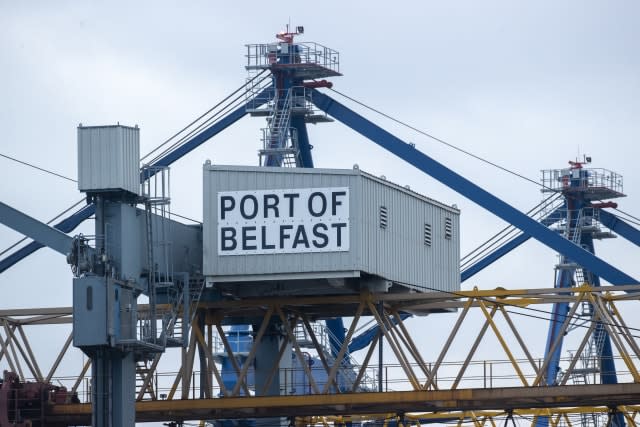Hauliers’ ‘trepidation’ as transition period ends

Hauliers in Northern Ireland are approaching the end of the Brexit transition with “trepidation”.
Many will keep volumes light for the first few days of 2021 as they wait to see what the impact will be, the industry said.
The Northern Ireland protocol agreement with the EU will help smooth the Irish Sea passage of goods from Great Britain and keep the land border with the Republic free-flowing.

Logistics UK’s Seamus Leheny said: “There is a bit of trepidation from operators out there.
“There is a lot more administration and red tape.”
The organisation’s Northern Ireland policy manager said paperwork on some Irish Sea movements would create costs which hauliers could not absorb and would have to pass on.
He added: “A lot of traders have cut back on deliveries this week. They are taking a step back. There should be lower volumes for a few days.”
Rules change for NI businesses tomorrow. Help keep your goods moving by signing up to the Trader Support Service.
It only take a few minutes.
Act now: https://t.co/5FtWi5pMhFpic.twitter.com/4fLHXYTpAL
— Northern Ireland Office (@NIOgov) December 31, 2020
To avoid disrupting cross-border trade and a return of checkpoints along the politically sensitive Irish border, the EU and UK agreed to move new regulatory and customs processes to the Irish Sea.
That means checks are focused on trade between Great Britain and Northern Ireland.
Mr Leheny said the protocol governing the new regime was better than nothing.
“At the minute we are taking a glass half full view of it. Our job is to make sure that goods get from A to B.”
He said it was an admin-heavy process but the advance declarations system seemed to be working.
Under the terms of the protocol, Northern Ireland remains in the EU single market for goods.
Northern Ireland will also apply EU customs rules at its ports, even though it is still part of the UK customs territory.
The protocol will also see Northern Ireland follow certain EU rules on state aid and VAT on goods.
As part of the single market, Northern Ireland will have to adhere to strict EU regulations on food standards and plant and animal health.
This will create additional SPS (sanitary and phytosanitary) checks on certain produce entering from Great Britain.
Currently 16 ferries arrive in Northern Ireland from Great Britain every day. They usually carry 175 roll on/roll off lorries and 275 unaccompanied freight units.
The latter units do not usually transport agri-food products, so the focus of the SPS checks will be on the roll on/roll off lorries.
While all hauliers will have to complete required online processes to alert the authorities of produce being shipped to Northern Ireland, it is anticipated that about 20-25% of the lorries will be selected for physical inspection on arrival.
While the protocol starts operating at 11pm on December 31, the EU and UK have agreed to two grace periods to give traders time to adjust.
Supermarkets and other food retailers have been given three months to adapt to the requirements of the new SPS checks.


